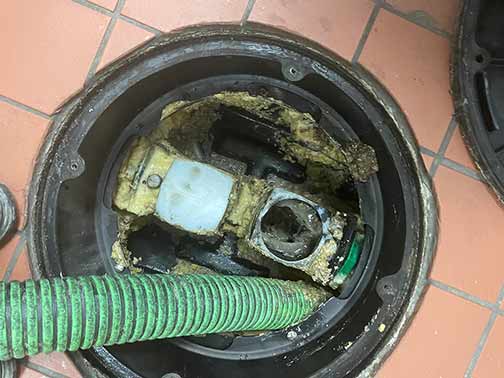
Restaurants, commercial kitchens and other establishments where food is prepared in large quantities are required by law to have grease traps on their premises. Ratner Management explains, grease traps minimize the amount of fats, grease and oils that find their way into the city sewer system from a kitchen’s operations.
Fats, oils and grease (or FOGs) are often responsible for some of the worst emergencies in municipal sewer systems. Along with causing severe blockages, they can trigger massive flooding by preventing the free passage of floodwater through the city storm drainage systems.
You can prevent this problem by isolating used-up grease at the source where it is created, namely, at the restaurant or commercial kitchen. It is far easier to control fats, oils and grease in this way than to try to manage it after it has entered and dispersed into the central sewer system.
But while protecting city infrastructure from damage by FOGs, grease traps can also pose a problem to the facilities where they are installed. Because they hold and store grease for long periods, grease traps often constitute a sanitary menace to businesses.
How do grease traps impact food safety and hygiene?
Increased risk of drain clogs and sewer backups
All grease traps come with at least one tank, and this tank is designed to hold a certain amount of grease. If this limit is exceeded, the grease trap will lose functionality and allow grease to escape into the main sewer line. That increases the risk of clogs and blockages in the establishment’s plumbing system.
The resulting buildup inside the main sewer line can cause backups. A sewer backup is easily the worst plumbing problem in a building. For restaurants, the impact of a backed-up sewer line is disastrous. The contaminated liquid that finds its way into the facility creates a health hazard for the staff and customers of the business.
Bad odors inside the restaurant
One fallout of a poorly-managed grease trap is that bad odors will start to find their way into the restaurant kitchen and dining area. There are two potential sources where these odors can emanate: the decomposing grease inside the overflowing grease trap and the building’s clogged drains.
Bad odors in a restaurant kitchen or dining area are not conducive to a pleasant dining experience. Any restaurant with this problem not only loses customers but it has to deal with a lot of negative publicity. That is in addition to the possibility of being fined or shut down by the authorities.
Problem with pests
Where there is a buildup of decomposing grease, clogged drains and bad odors, there will be pests – roaches, rats, and all kinds of dangerous and despicable vermin. The presence of these pests increases the risk of food contamination with a greater possibility of food poisoning for customers and staff.
Pests may even find their way into the dining area, annoying and frightening guests. No reputable restaurant wants to subject its customers to such experiences. A pest problem in your restaurant will damage your business’s reputation and put the restaurant on the radar of city health officials.
Importance of regular grease trap cleaning and maintenance
To prevent the above problems, every city has clear rules and regulations on how grease traps should be cleaned, how often they should be cleaned and by whom. By following these guidelines, restaurants and commercial kitchens can secure the following benefits.
Ensure grease trap efficiency
A neglected grease trap quickly loses the ability to perform its primary function: to trap grease. An inefficient grease trap can throw your building’s drainage system out of order. The impact of a malfunctioning grease trap can ripple outwards until it affects the restaurant’s productivity in unexpected ways.
Extend the life of your equipment
A poorly maintained grease trap will have a shorter service life; it will fail before it reaches the end of the manufacturer’s projected service lifespan. That happens because grease releases fatty acids as it breaks down, and these acids can eat through the walls of the grease trap. A neglected grease trap can also damage your kitchen equipment.
Saves money and time
Maintaining your grease trap in line with regulations helps to streamline your restaurant’s operations. In addition to avoiding unnecessary costs – grease trap repairs, plumbing issues and fines – you limit operational inefficiencies due to grease trap issues. Working puts money in your pocket by helping to keep customers happy.
Regular grease trap cleaning ensures compliance
The food industry is highly regulated, and there are good reasons for this. It costs your restaurant very little to abide by these regulations. The cost of keeping up with grease trap cleaning is a minor expense compared to paying huge fines to the authorities or losing your operating license.
Regular grease trap cleaning is a service that benefits the city and environment and holds immense benefits for your restaurant and the customers it serves.


